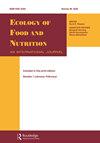“Just sit and eat.” Adult and Child Mealtime Responsibilities in Early Care and Education Centers During COVID-19 in Florida
IF 1.3
4区 医学
Q4 NUTRITION & DIETETICS
引用次数: 0
Abstract
ABSTRACT Most young children in the United States attend early care and education (ECE) programs, in which they eat 3–4 times daily. ‘Division of responsibility’ between adult and child means the adults are responsible for what, when and where, and the child is responsible for whether, what and how much to eat. A balanced division of responsibility can support children’s development of healthy eating competency. This paper aims to describe division of responsibility during mealtimes during COVID-19 in Florida using a cross-sectional, mixed methods design. Questions were developed based on Trust Model and Social Cognitive Theory. A survey was completed by 759 ECE directors and 431 teachers, and 29 teachers completed in-depth interviews. COVID-19 increased teacher mealtime responsibilities. Most (95%+) ECE teachers provided meals at the same time and place daily (when and where). Children determined what and how much they ate, but did not serve or handle food. Implications include modifying mealtime routines to minimize the risk of COVID-19 and support healthy eating with a balanced division of responsibility.“坐着吃吧。”新冠肺炎期间,佛罗里达州早期护理和教育中心的成人和儿童膳食责任
摘要:在美国,大多数幼儿参加早期护理和教育(ECE)项目,他们每天吃3-4次成年人和儿童之间的“责任划分”意味着成年人负责什么、什么时候、在哪里吃,儿童负责是否吃、吃什么和吃多少。均衡的责任分工可以支持儿童健康饮食能力的发展。本文旨在描述佛罗里达州新冠肺炎期间用餐时间的责任分工,采用横截面混合方法设计。问题是基于信任模型和社会认知理论提出的。759名欧洲经委会主任和431名教师完成了一项调查,29名教师进行了深入访谈。新冠肺炎增加了教师在用餐时间的责任。大多数(95%以上)欧洲经委会教师每天在同一时间和地点(何时何地)提供膳食。孩子们决定吃什么和吃多少,但不提供或处理食物。影响包括修改用餐时间安排,以最大限度地降低新冠肺炎的风险,并通过平衡的责任分工支持健康饮食。
本文章由计算机程序翻译,如有差异,请以英文原文为准。
求助全文
约1分钟内获得全文
求助全文
来源期刊
CiteScore
3.50
自引率
0.00%
发文量
23
审稿时长
>12 weeks
期刊介绍:
Ecology of Food and Nutrition is an international journal of food and nutrition in the broadest sense. The journal publishes peer-reviewed articles on all aspects of food and nutrition -- ecological, biological, and cultural. Ecology of Food and Nutrition strives to become a forum for disseminating scholarly information on the holistic and cross-cultural dimensions of the study of food and nutrition. It emphasizes foods and food systems not only in terms of their utilization to satisfy human nutritional needs and health, but also to promote and contest social and cultural identity. The content scope is thus wide -- articles may focus on the relationship between food and nutrition, food taboos and preferences, ecology and political economy of food, the evolution of human nutrition, changes in food habits, food technology and marketing, food and identity, and food sustainability. Additionally, articles focusing on the application of theories and methods to address contemporary food and nutrition problems are encouraged. Questions of the relationship between food/nutrition and culture are as germane to the journal as analyses of the interactions among nutrition and environment, infection and human health.

 求助内容:
求助内容: 应助结果提醒方式:
应助结果提醒方式:


